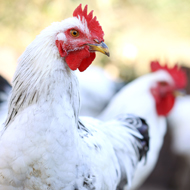NI urges vigilance following avian flu outbreak

Farmers in Northern Ireland are being urged to be vigilant following an outbreak of avian flu in Lancashire.
Poultry farmers in Northern Ireland are being urged to be vigilant following confirmation of an outbreak of avian flu in England.
Defra established a 10km protection and surveillance zone around an egg production premises near Preston in Lancashire on 13 July.
Agriculture minister Michelle O'Neill said: "This outbreak has been declared in England only. My department has been liaising with DEFRA who have made it clear that the risk to public health is very low and that there is no risk to the food chain.
“Since they became aware of the early indications of the disease in Lancashire, my staff have been in direct contact with key poultry industry representatives and stakeholders in the north of Ireland to advise them of the situation and to call for increased vigilance. While the situation will be kept under review, I would encourage bird keepers, as a precaution, to revisit their own biosecurity.
“As a precaution the general licence for import of live poultry, poultry meat, poultry products, or hatching eggs from Britain has been suspended and anyone wishing to import these should apply to the Department for a specific licence.”
Northern Ireland's chief veterinary officer, Mr Robery Huey, added: “We are continuing to liaise closely with DEFRA and are conducting a veterinary risk assessment for the north of Ireland, the results of which will inform whether any additional local control measures are required at this time. We have informed our counterparts in the south of the situation and will continue to work closely with them to ensure that we apply consistent and proportionate measures to protect the island of Ireland.”
Defra is investigating the case and the humane culling of all poultry on the Lancashire farm continues.



 The Animal and Plant Health Agency (APHA) has updated its online reporting service for dead wild birds.
The Animal and Plant Health Agency (APHA) has updated its online reporting service for dead wild birds.